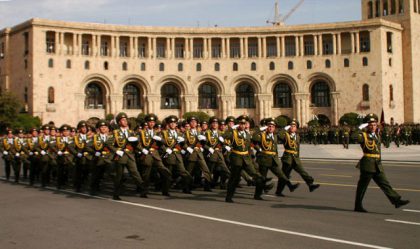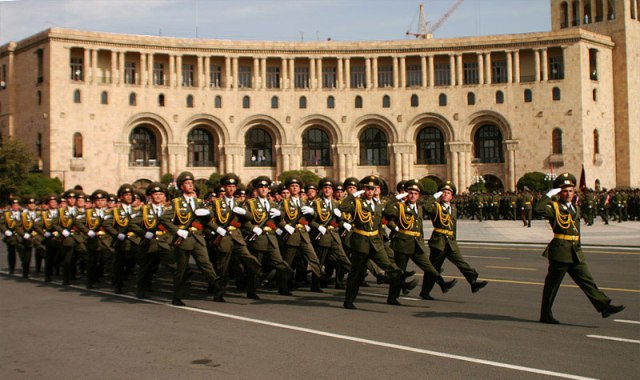
Boris Tamoyan interviews Gevorgyan Theological Seminary graduate Armen Badalyan, who had conducted spiritual service in the Armenian national army in the years 2008-2010.
What is the role of the Armenian Apostolic Church in the army life today?
The role can be summed up in spiritually educating the soldiers, in warning them against perils, in stressing the importance of the military service and in raising their awareness towards their own history.
When and by whom was this spiritual service implemented in the national army?
The spiritual service was introduced in the army in 13 November 1997 by His Holiness Catholicos Vazken I, and then Defense Minister late Vazken Sarkissian; as for the service order, it was affirmed on 14 September 2000.
Which ecclesiastical ranks are able to fulfill the spiritual service?
The majority of the spiritual servants in the army are deacons, but today, driven by the necessity of this service, we can also find [married] priests. The general spiritual supervisor of the army is Bishop Vrtanes Abrahamyan.
You too served in the national army in 2008-2010, what kind of problems did the soldiers have?
The main problems in the army occur because of unhealthy interpersonal relations, which in the long run lead to clashes.
And what do these clashes lead to?
The weak ones become more self-contained and have a more suppressed emotional status, which could lead to dangerous consequences, such as self-mutilation, beatings and suicide. All of this could distract the soldier from his main task, i.e. realizing the importance of his own service.
What?s the role of the spiritual servant in such cases?
Well, he should make them aware that a real Christian does not impose himself on the weak, instead he is ready to support his colleagues in need. Since the main role of the soldier is to protect his homeland, inner strives can weaken his stance against the enemies.
Today, minority representatives also serve in the national army; they sometimes have different religions and beliefs. To what extent do the spiritual servants aid them?
Since they share the same environment, they all have the same interpersonal problems; the spiritual servant has to exert his efforts to solve their problems without any discrimination.
Finally, what do you want to say to the soldiers in our army?
The relationship between the soldier and the officer should not be perceived as an obligation; it should be based on the awareness of the importance of each one?s personal function in the army. The importance of such a service should teach both the officer and the soldier to deal more seriously with this task, since they are both here for the same purpose, and that is TO PROTECT THEIR HOMELAND.
Text translated by Nanor Mikayelian.
Original text in Armenian
Հոգեվոր ծառայությունը Ազգային բանակում
Բորիս Թամոյան
Այս թեմայով կզրուցենք Գեվորգյան ճեմարանի շրջանավարտ (աստվածաբանության մագիստրոս) Արմեն Բադալյանի հետ ով 2008-2010 թվականներին Ազգային բանակում հոգեվոր ծառայություն է իրականացրել:
Այսոր ինչ դեր ունի Առաքելական սրբ. եկեղեցին Հայոց բանակի կյանքում:
Եկեղեցու դերը բանակի կյանքում հոգեվոր դաստիրակության, հոգեվոր վտանգներից զգուշացման, զինծառայության կարեվորության, սեփական պատմության ծանոթացման մեջ է:
Հոգեվոր ծառայությունը երբ եվ ում կողմից է ներդրվել Ազգային բանակում:
Հոգեվոր ծառայությունը բանակում ներդրվել է 1997 թ. նոյեմբերի 13-ից Վազգեն 1-ին կաթողիկոսի եվ Վազգեն Սարգսյանի կողմից, իսկ ծառայության կարգը հաստատվել է 2000 թվականի սեպտեմբերի 14-ին:
Եկեղեցական նվիրապետության որ աստիճանի հոգեվորականներն են իրականացնում հոգեվոր ծառայությունը:
Բանակում հոգեվոր ծառայողների մեծամասնությունը սարկավագներն են, բայց այսօր ելնելով հոգեվոր ծառայության անհրաժեշտությունից ծառայություն են կատարում նաեվ քահանաները: Բանակի ընդհանուր հոգեվոր առաջնորդը Վրթանես եպիսկոպոս Աբրահամյանն է:
Դուք նույնպես 2008-2010 թվականներին հոգեվոր ծառայություն եք իրականացրել Ազգային բանակում, ծառայության ընթացքում ինչ խնդիրներ եք նկատել զինծառայողների մոտ:
Բանակում հիմնական խնդիրները առաջանում են միջանձնային ոչ ճիշտ հարաբերություններն են որոնք ի վերջո բերում են բախումների:
Ինչի՞ են հանգեցնում այդ բախումները:
Դրանց արդյունքում կամային ավելի թույլ զինվորները հայտնվում են ինքնամփոփ եվ ընկճված հոգեվիճակում, որը կարող է ծնել զինծառայության համար վտանգավոր հետեվանքներ`ինքնախեղում, ծեծկրտուք ընդուպ ինքնասպանություն: Այս ամենը զինծառայողին շեղում է գլխավորից` սեփական ծառայության կարեվորության գիտակցումից:
Այս դեպքում որն է հոգեվոր ծառայողի դերը.
Նման դեպքերում հոգեվորականը արթնացնում է այն գիտակցումը, որ քրիստոնեական իմաստով մեծ չէ նա, ով ի վիճակի է ներգործելու թույլի վրա, այլ նա, ով պատրաստ է օգնելու եվ դժվարության մեջ թիկունք լինելու ընկերոջը: Քանի որ զինվորի գլխավոր դերը հայրենիքի պաշտպանությունն է, իսկ ինքն իր մեջ վեճեր ունեցող կառույցը չի կարող ամուր լինել թշնամու դեմ:
Այսոր Հայոց բանակում ծառայում են ազգային փոքրամասնությունների ներկայացուցիչներ, ովքեր ունեն այլ կրոն ու դավանանք, ինչքանով է իրենց օգնում հոգեվոր ծառայողը:
Նախ ապրելով նույն միջավայրում նրանց համար նույնպես ծագում են միեվնույն միջանձնային խնդիրները, հոգեվորականը պարտավոր է առանց խտրություն դնելու հոգալ նաեվ նրանց խնդիրների լուծման համար:
Եվ վերջում ձեր խոսքը մեր բանակի զինծառայողներին:
Զինվոր- սպա հարաբերությունը պետք է ընկալվի ոչ թե պարտավորությունների ձեվով, այլ սեփական դերի եվ նրա կատարման անհրաժեշտության գիտակցությունը: Զինծառայության կարեվորությունը պետք է սովորեցնի եվ սպային, եվ զինվորին ավելի լուրջ վերաբերվել ծառայությանը քանի որ երկուսի գործնել նույնն է` ՀԱՅՐԵՆԻՔԻ ՊԱՇՏՊԱՆՈՒԹՅՈՒՆԸ:

